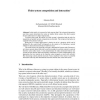Free Online Productivity Tools
i2Speak
i2Symbol
i2OCR
iTex2Img
iWeb2Print
iWeb2Shot
i2Type
iPdf2Split
iPdf2Merge
i2Bopomofo
i2Arabic
i2Style
i2Image
i2PDF
iLatex2Rtf
Sci2ools
114
click to vote
GI
2010
Springer
2010
Springer
Finite System Composition and Interaction
: In this article, it is proven for finite systems that if by reciprocal interaction, one finite system determines the action of another finite system, then both systems become subsystems of a larger supersystem. To achieve this result, the notion of a finite system is formalized and the rules for sequential and parallel system composition are provided. The reciprocal interaction is captured by the protocol concept. Being part of a larger supersystem is shown not to be a property which can be attributed to the system itself but depends on the context of its interaction, namely whether its interactions determine its behavior or not. The result seems to be especially relevant in Information Systems and eCommerce, as it raises concerns about what end-to-end for example in a security context in a system theoretic sense really means. It also demonstrates the tight connection between our system and our function notion and thereby contributes to a better understanding, why approaches that res...
Function Notion | GI 2010 | Larger Supersystem | Reciprocal Interaction | Theoretical Computer Science |
Related Content
| Added | 11 Feb 2011 |
| Updated | 11 Feb 2011 |
| Type | Journal |
| Year | 2010 |
| Where | GI |
| Authors | Johannes Reich |
Comments (0)

